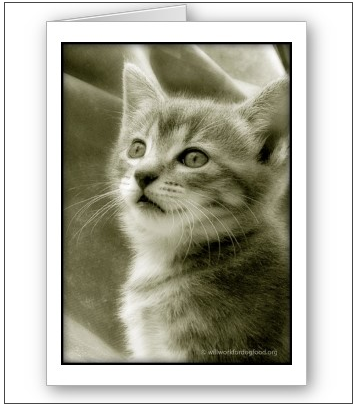
Cat Tales: Separating Fact from Fiction
 Despite their popularity, myths about cats persist. Separating fact from fiction provides a greater understanding of how to meet their special needs.
Despite their popularity, myths about cats persist. Separating fact from fiction provides a greater understanding of how to meet their special needs.
- A falling cat always lands on its feet When a cat falls a short distance, it often twists itself around to right itself and land on its feet. However, falls from heights can cause severe injury or death. A window without a screen or with an insecurely fastened screen is a life-threatening hazard. Other accidents happen when an air conditioner is removed from the window for cleaning or repair. Balconies are also a danger. A cat may fall from a balcony rail as it chases an insect. Securely fastened screens and being alert to other high-rise dangers help prevent serious injuries resulting from falls.
- Cats have nine lives This myth probably started as the result of a cat’s flexible skeleton that allows squeezing and twisting to negotiate narrow and awkward places. The factors that influence a cat’s longevity are proper diet and care, including regular visits to the veterinarian, and the cat’s genetic makeup. The average life span for a neutered cat who is housed inside is estimated to be from 12 to 14 years. The maximum life span is said to be 35 years. The roaming cat’s life expectancy is usually less than that of a cat housed indoors. This may relate to a more stressful lifestyle as the results of accidents, fighting and exposure to weather extremes.
- Cats can see in the dark Cats cannot see in total darkness, but they can see much better at night with minimum light than humans can. Their vision in dim light is very sensitive. Protecting a cat’s vision is one of the reasons a cat should never be fed dog food. Unlike dogs, cats cannot manufacture the amino acid taurine. Lack of taurine in the cat’s diet can cause vision problems. Cats require a higher level of protein in their diet than dogs.
- All cats like fish There is no particular food that all cats like. This is why cat foods are available in a variety of flavors and textures. Once you find nutritionally complete and balanced cat food your cat enjoys, stay with it. Frequent diet changes may create a finicky eater and cause digestive upsets. Be certain the package label states that the product has undergone feeding trials in accordance with the Association of American Feed Control officials (AAFCO) protocol.
- Neutered cats become fat and lazy Although neutered cats may become obese, this condition can be prevented. If the cat begins to gain weight, eliminate food from the table and, if necessary, reduce the amount of cat food offered. Cats can be encouraged to exercise through play. If there are questions about a cat’s body condition, a veterinarian should be consulted. Spaying and neutering have many benefits. Spaying a female cat before her first heat cycle can help prevent mammary tumors and uterine infections.

What do you think?